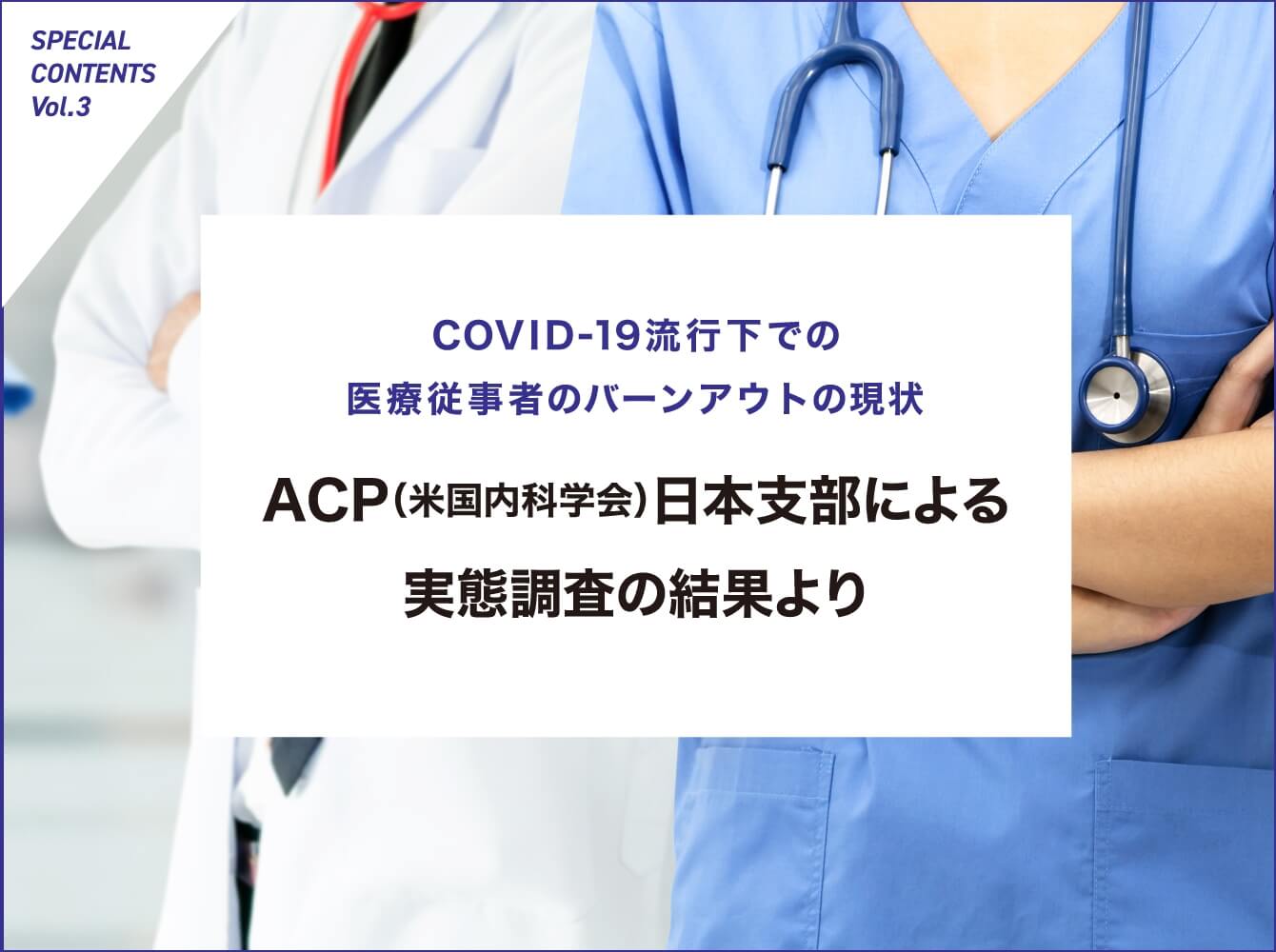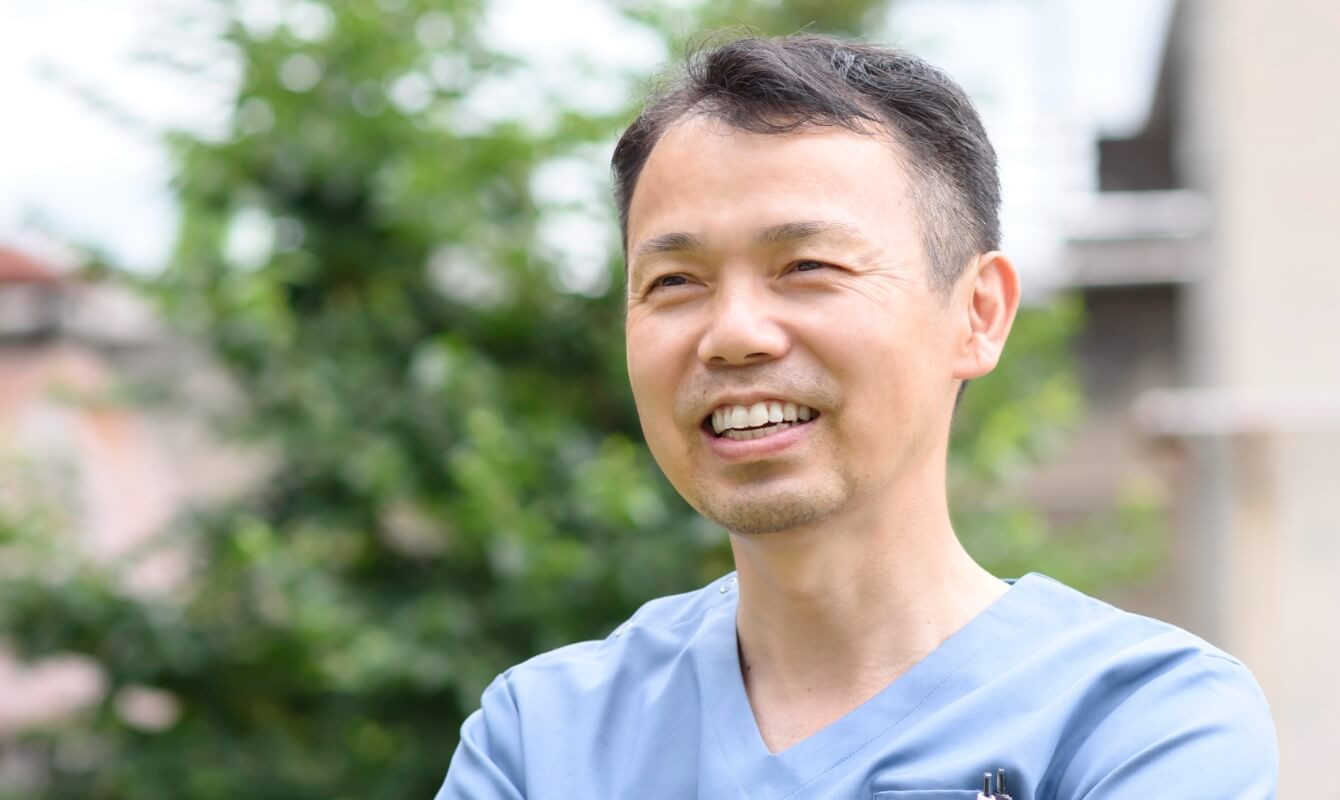

With the prolongation of COVID-19, the harshness of medical practice continues to increase. Under this epidemic of infectious diseases, which has been prolonged for a long time, there is concern about burnout, in which the mind and body of medical professionals become extremely exhausted and lose their motivation as if they were burned out.
With the philosophy of "contribution to regional medical care," the Group has supported local medical sites through the supply of medical equipment. As a company that supports the medical field, we are thinking of creating an environment where many people can get to know the actual situation of the corona vortex and medical professionals can fully demonstrate their original abilities.
Therefore, this time, the chairman, Professor Tetsuya Makiishi (Shimane University), is the representative of the Physician's Well-being Committee of the Japan Chapter of the ACP (American Society of Internal Medicine), which has been conducting a fact-finding survey on the burnout of medical professionals and future activities. I heard the story as.


Chairman of ACP Japan Chapter Physicians' Well-being Committee
Professor, Department of Comprehensive Medical Sciences, Shimane University School of Medicine
Tetsuya Makiishi
Career of ACP Japan Chapter
The American Society of Internal Medicine (ACP) is a merger of the American Society of Internal Medicine (founded in 1915) and the American Society of Internal Medicine (founded in 1956) and has a history of more than 100 years. In 2003, the Japan branch was established as the first branch outside the Americas. Kiyoshi Kurokawa will be the first branch manager, and Kenji Maeda will be the fourth branch manager in 2021.
In 2019, the ACP Headquarters started the'ACP Physicians' Well-being Project'to train human resources to tackle the world's most serious doctor burnout problem. In the spring of 2019, 1-2 members from all over the United States and outside the United States will meet in Philadelphia for three days of training as a Well-being Champion, followed by a doctor's burnout at each branch. We are working on it. Dr. Makiishi participated from the Japan branch and started team activities with 11 members after returning to Japan. Since July 2021, he has been active as the Physicians' Well-being Committee (ad hoc) of the ACP Japan Chapter.
Burnout of medical professionals such as doctors and nurses has become a problem since the 2010s, and in September 2018, the American Medical Association Magazine (JAMA) published about doctor burnout. A systematic review has been published. In Japan as well, the burnout of doctors, nurses, and caregivers is attracting attention, but although personal experiences and actual conditions at specific medical institutions and facilities are reported, the actual conditions nationwide were not known. ..
Under such circumstances, in 2019, the Physician's Well-being Team, a group of volunteers, started activities for the current situation and countermeasures of doctors' burnout in the Japan Chapter of the American Society of Internal Medicine (ACP), and in 2021 Recognized for his achievements, he has been promoted to the Physician's Well-being Committee and continues to work.
The ACP Japan Chapter is the Japan Chapter of the ACP, an international internal medicine society with members in 162 countries around the world. It is an organization established by working on ACP. The number of members of ACP Japan Chapter is currently about 1,200.
The ACP Headquarters, which felt a sense of crisis that the systematic review revealed that there were many doctors' burnouts, decided that global efforts were necessary, and from 2018, the `` ACP Well-Being Champion Program'' "It was started. One or two people from each ACP branch will attend a three-day seminar to learn how to deal with Physicians' Well-being issues and coaching. As a Physicians' Well-being defender (Champion), the graduates will form a team at each branch and conduct a burnout survey for doctors called the Mini-Z survey for all branch members, as a result. You will be instructed to share with the ACP headquarters and raise awareness within the branch about well-being and coaching.

ACP Philadelphia Workshop
Currently, the ACP Japan Chapter has 12 Physicians' Well-being Committee members, and the core member of the team is Tetsuya Makiishi, who attended the seminar in the United States. The team first created a Japanese version of the Mini-Z 2.0 survey. The Maslach Burnout Inventory (MBI) is commonly used worldwide as a measure of burnout symptoms, but because it is a long and difficult questionnaire, the Mini-Z for doctors based on the MBI. A simple burnout questionnaire was developed, and the improved version was translated into Japanese. Mr. Makiishi says, "We translated and reverse-translated the questionnaire, confirmed the reliability, and the results were made into a dissertation and evaluated academically."
Using this Mini-Z 2.0, the ACP Japan Chapter conducted an online questionnaire survey on burnout for 1,200 branch members. It has been held three times since 2020, and in June 2021, an online workshop on doctors' burnout and well-being was held based on the results.
The questionnaire consists of about 10 items, whether you are satisfied with your work, what are the symptoms based on the definition of "burnout", whether you and your boss have the same professional values, and whether the team is working well. I am asking if I can adjust the amount of work myself, if I feel stressed, and when I feel stressed.
In the first survey, about 300 people, 25% of the members, responded, and about 30% of them were certified as burnout. This tendency was similar in the second and third surveys after the start of the COVID-19 epidemic. However, in the second survey, a quarter of the respondents said that the burnout situation was worse than before Corona. As a result of the analysis, there were many doctors who experienced self-isolation as close contacts and the burnout situation worsened, and a statistically significant difference was observed. Mr. Makiishi said, "There were many respondents who said,'I felt like I was about to break my heart.' He is influenced by Corona in various "routes" such as being "stigmatized" as a doctor at the hospital that accepted him and having his salary dropped. "

Previous overseas reports have reported that female doctors and young doctors have a high burnout rate even before Corona, and that by clinical department, emergency departments and general medical doctors have a high burnout rate. .. Regarding this, Mr. Makiishi speculates that "emergency and general medical doctors are in a position to see patients who receive various complaints, and it will be stressful." In fact, the burnout rate of emergency doctors and primary care doctors was around 50% in the questionnaire survey of the ACP Japan Chapter. Mr. Makiishi said, "Since the response rate is 25%, I don't know if it accurately reflects the actual situation, but it seems that Japan has the same tendency as the world."
The high burnout rate of female doctors did not change much before and after Corona, but "it seems that" work "other than work, that is, doing housework and childcare, is stressful. It has the same tendency as female doctors in Western countries who are in the same situation, "says Makiishi.
Makiishi points out, "Especially when thinking about burnouts and psychological effects in the Korona-ka, be careful because each health care worker is in a different position." For example, relationships with colleagues and bosses can have an impact. It is also generally said that patients tend to talk to female doctors longer than male doctors, which can lead to higher patient satisfaction, but female doctors spend more time listening to patients, which can be stressful. There is sex.
“Being directly involved in corona care does not always lead to burnout,” says Makiishi. For some, the sense of mission for corona care has been shown to increase resilience (the ability to adapt and resolve difficult situations and stresses). On the other hand, there are reports that burnouts increase even if you are not involved in corona treatment. It is thought that the causes are a decrease in income for practitioners, an increase in work other than corona for nurses, and a feeling of alienation that cannot be involved in corona medical treatment. The painful experience can be unknowingly flashed back and burnouts can increase, "Makiishi points out.
In addition, doctors, nurses, and comedic student training have been online for about two years, which can lead to business burnouts due to confusion when they go to clinical practice or the inability to proceed smoothly. It is possible that the number will increase, and it is likely that "careful follow-up is required" (Makiishi).
Possible risk factors for burnout were as follows before the Korona-ka.
・ Satisfaction with the work you are engaged in is low.
・ Professional values do not match those of clinical bosses.
・ Communication within the medical team to which he belongs is poor.
・ I can't adjust my workload myself
・ I feel a lot of stress at work.
・ The work environment is busy.
・ Being a woman.
It is not yet known what risk factors are increasing after the corona, but Mr. Makiishi says, "It depends on the position, so I would like to continue to clarify it through questionnaire surveys."
As already mentioned, losing income is stressful for some. In Japan, the decrease in income of pediatrics is conspicuous, and in the United States, for example, it is reported that the decrease in income of plastic surgery is remarkable. Some doctors find it stressful to have more online work, while others say that treating corona-infected people is stressful. According to a questionnaire by the ACP Japan Chapter, it was stressful to be a medical profession during the second and third waves of the epidemic. The reasons are that I was refused to take a taxi, I couldn't leave my child in a nursery center, and I couldn't go home for a long time and continued to live in a hotel. This may still be the case.
To prevent burnout, "it is important to increase resilience at the individual level," says Makiishi. It's important to talk to someone who is close to you about the amount of work you do. In addition, organizationally, it is necessary to create a system where coaching is possible and an environment where it is easy to say worries and problems. By verbalizing what you want to appeal to, your resilience will increase. And most importantly, the organization that receives the proceedings optimizes the workload.
At a seminar held at ACP headquarters in the United States in 2019, Mr. Makiishi learned that burnout countermeasures are to investigate the situation of burnout, intervene in the field based on the results, and conduct another investigation. It was to continue. In the future, the ACP Japan Chapter hopes that each prefecture will conduct a Mini-Z 2.0 survey, and that not only branch members but also communities and hospitals will intervene in the burnout of healthcare professionals.
"It is important for healthcare professionals to think and face themselves that burnout is close at hand." The ACP Japan Chapter is strongly appealing.